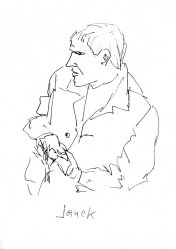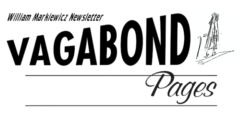
Unfortunately I can’t give his family name even if, as readers will find out, it has an important place in history. Janek was born either in Westphalia like his parents or in France. He had some German blood, I am not sure from which side. In Polish he spoke correctly; in French, like a Frenchman. During the war, when he was 8 or 9 years old, his father sent him to the Hitlerjugend. Janek told me how the whippersnappers of his age sliced each other to death with duelling swords. He had a hard school in the Hitlerjugend. He didn’t talk about it much and asked me for discretion, which I keep … He was a passionate Polish patriot and once, during a discussion with colleagues about European federalism, he lectured: “Boleslaw the Valiant (10-11th century) was a federalist?! Sobieski (17th century) was a federalist?! Federalism is a Jewish invention!” Despite his fierceness, Janek was sentimental. I was one of the few who was aware of it and that’s why we were friends. Janek loved girls and it was reciprocated. He told me how the most sophisticated women became prostitutes in his bed and I believed him because Janek had no imagination.
He got together with a very beautiful French girl; she helped him financially while he studied, and then they married. When the war in Algeria broke out, Janek was drafted. He told me about savage battles and I could imagine Janek in action. When I met him after the war, all his life was on a downward slide and probably never recovered. While he was on the front lines his wife had left him. Not knowing the facts, I can’t blame her. Janek could be impossible to live with. Coming home in his tattered uniform, sick and wounded, he found the apartment padlocked and had to go to a hotel. The army left him with black memories. Somebody made a Jew of him saying that his name sounded like ‘Moses.” I’m sorry that I can’t quote his name so the reader would understand what an absurdity it was. Anyway, this Nordic from the Hitlerjugend collected bullying for ‘Jewishness.’ I didn’t ask him who set him up — Pole, French or German — the French army is pretty multicultural. It was tragicomical coincidence that a real Jew, a neighbour of his parents, was serving with him in the same unit. Both mothers were friends and both wept about the fate of their sons, the true and the fabricated Jew. I lost contact with him for a year and when we met I realised he’d never recover from that trauma.
By chance I saw him on the street one night, walking with a bunch of hoodlums. He himself seemed under the effect of alcohol or drugs. He exuded cynicism. I felt we had nothing more in common; that I could do nothing for him, and I remained unnoticed..
#88 excerpt, 4 Portraits, July-August 2005
